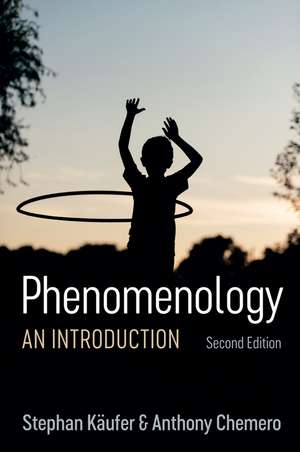Phenomenology – An Introduction
Autor S Käuferen Limba Engleză Paperback – 20 mai 2021
New to this second edition are a treatment of nineteenth-century precursors of experimental psychology; a detailed exploration of Husserl's analysis of the body; and a discussion of the work of Aron Gurwitsch and other philosophers and psychologists who explored the intersection of phenomenology and Gestalt psychology. The new material also includes an expanded consideration of enactivism, and an up-to-date examination of current work in phenomenologically informed cognitive science.
This is an ideal introduction to phenomenology and cognitive science for the uninitiated, and will shed new light on the topic for experienced readers, showing clearly the contemporary relevance and influence of phenomenological ideas.
| Toate formatele și edițiile | Preț | Express |
|---|---|---|
| Paperback (1) | 145.02 lei 22-36 zile | +18.84 lei 5-11 zile |
| Polity Press – 20 mai 2021 | 145.02 lei 22-36 zile | +18.84 lei 5-11 zile |
| Hardback (1) | 520.02 lei 43-57 zile | |
| Polity Press – 20 mai 2021 | 520.02 lei 43-57 zile |
Preț: 145.02 lei
Nou
Puncte Express: 218
Preț estimativ în valută:
27.75€ • 29.05$ • 22.96£
27.75€ • 29.05$ • 22.96£
Carte disponibilă
Livrare economică 17-31 martie
Livrare express 28 februarie-06 martie pentru 28.83 lei
Preluare comenzi: 021 569.72.76
Specificații
ISBN-13: 9781509540662
ISBN-10: 1509540660
Pagini: 288
Dimensiuni: 156 x 229 x 25 mm
Greutate: 0.46 kg
Ediția:2nd Edition
Editura: Polity Press
Locul publicării:Chichester, United Kingdom
ISBN-10: 1509540660
Pagini: 288
Dimensiuni: 156 x 229 x 25 mm
Greutate: 0.46 kg
Ediția:2nd Edition
Editura: Polity Press
Locul publicării:Chichester, United Kingdom
Notă biografică
Cuprins
Acknowledgements
List of Figures
Introduction
1 Kant: Eighteenth and Nineteenth-Century Background
1.1 Kant's critical philosophy
1.2 Intuitions and concepts
1.3 The transcendental deduction
1.4 Kantian themes in phenomenology
2 The Rise of Experimental Psychology
2.1 Wilhelm Wundt and the rise of scientific psychology
2.2 William James and functionalism
2.3 The structuralism-functionalism debate
3 Edmund Husserl and Transcendental Phenomenology
3.1 Transcendental phenomenology
3.2 Brentano
3.3 Between logic and psychology
3.4 Ideas
3.5 The body
3.6 Phenomenology of time consciousness
4 Martin Heidegger and Existential Phenomenology
4.1 The intelligibility of the everyday world
4.2 Descartes and occurrentness
4.3 Being-in-the-world
4.4 Being-with others and the anyone
4.5 The existential conception of the self
4.6 Death, guilt, and authenticity
5 Gestalt Psychology
5.1 Gestalt criticisms of atomistic psychology
5.2 Perception and the environment
5.3 Influence of Gestalt psychology
6 Aron Gurwitsch: Merging Gestalt Psychology and Phenomenology
6.1 Phenomenology of Thematics and of the Pure Ego
6.2 Others and the Social World
7 Jean-Paul Sartre: Phenomenological Existentialism
7.1 Transcendence of the Ego
7.2 The Imagination and The Imaginary
7.3 Being and Nothingness
8 Maurice Merleau-Ponty: The Body and Perception
8.1 Phenomenology of Perception
8.2 Phenomenology, psychology, and the phenomenal field
8.3 The lived body
8.4 Perceptual constancy and natural objects
9 Critical Phenomenology
9.1 The path not taken
9.2 Phenomenology and Gender
9.3 Phenomenology and Race
10 James J. Gibson and Ecological Psychology
10.1 Gibson's early work: Two examples
10.2 The ecological approach
10.3 Ecological ontology
10.4 Affordances and invitations
11 Hubert Dreyfus and the Phenomenological Critique of Cognitivism
11.1 The cognitive revolution and cognitive science
11.2 "Alchemy and artificial intelligence"
11.3 What Computers Can't Do
11.4 Heideggerian artificial intelligence
12 Enactivism and the Embodied Mind
12.1 Embodied, Embedded, Extended, Enactive
12.2 The Original Enactivism
12.3 Other Enactivisms: The sensorimotor approach and radical enactivism
12.4 Enactivism as a Philosophy of Nature
13 Phenomenological Cognitive Science
13.1 The frame problem
13.2 Radical embodied cognitive science
13.3 Dynamical systems theory
13.4 Heideggerian cognitive science
13.5 The future of scientific phenomenology
References
Index
